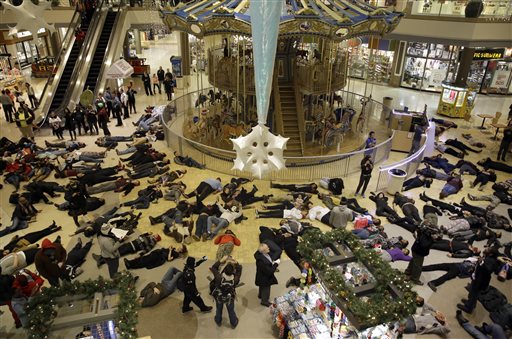The Supreme Court’s decision in Lloyd Corporation, Ltd. v. Tanner, 407 U.S. 551 (1972), which emerged from the divisive debates that surrounded the Vietnam War, specified the limits to free speech on private property.
Vietnam war protestors told to leave mall after leafleting
On November 14, 1968, Donald Tanner, Betsy Wheeler, and Susan Roberts went inside the Lloyd Center mall in Portland, Oregon, to distribute notices of a meeting of the “Resistance Community” to protest the draft and the war in Vietnam.
A mall security guard told the protesters that they were trespassing and that they would be arrested unless they stopped distributing leaflets within the Lloyd Center. They departed and filed suit, claiming that their ejection from the mall violated their First Amendment right to free speech.
District court said prohibiting handbill distribution in mall violated the First Amendment
The district court noted that the Lloyd Center “is open to the general public,” found that the mall is “the functional equivalent of a public business district,” and held that the Lloyd Center’s “rule prohibiting the distribution of handbills within the Mall violates . . . First Amendment rights.”
The district court finding of fact derived from two Supreme Court precedents. In Marsh v. Alabama (1946), the Supreme Court overturned the trespassing conviction of Jehovah’s Witnesses who were arrested for distributing religious literature in the company town of Chickasaw, Alabama. In that case, Justice Hugo L. Black equated company-owned Chickasaw with “any other town and shopping center.”
Amalgamated Food Employees Union Local 590 v. Logan Valley Plaza (1968), involving disputed picketing at a non-union grocery store, extended the Marsh view that “[t]he shopping center here is clearly the functional equivalent of the business district of Chickasaw. . . .”
Supreme Court said mall could limit leafleting
The Supreme Court’s 5-4 decision rejected this analysis and reversed the holding.
Writing for the majority, Justice Lewis F. Powell Jr. observed that the “[r]espondents’ argument . . . misapprehends the scope of the invitation extended to the public. The invitation is to come to the Center to do business with the tenants. . . . There is no open-ended invitation to the public to use the Center for any and all purposes.”
This article was originally published in 2009. James C. Foster is Professor Emeritus of Political Science at Oregon State University-Cascades.

